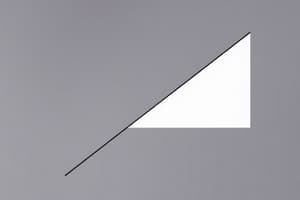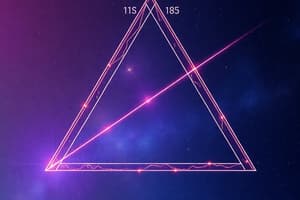Podcast
Questions and Answers
What practical use did mariners have for trigonometry in its early origins?
What practical use did mariners have for trigonometry in its early origins?
Finding latitude or determining distance from shore
What type of triangle does trigonometry primarily focus on?
What type of triangle does trigonometry primarily focus on?
Right triangle
What are the characteristics of a 45-45-90 right triangle?
What are the characteristics of a 45-45-90 right triangle?
Equal opposite sides
What functions can be used to calculate unknown lengths or angles in a right triangle?
What functions can be used to calculate unknown lengths or angles in a right triangle?
Signup and view all the answers
How are sin(x), cos(x), and tan(x) defined in the context of right triangles?
How are sin(x), cos(x), and tan(x) defined in the context of right triangles?
Signup and view all the answers
What does sin(60) equal in a triangle where x = 60 degrees?
What does sin(60) equal in a triangle where x = 60 degrees?
Signup and view all the answers
What practical fields benefit from the use of trigonometry?
What practical fields benefit from the use of trigonometry?
Signup and view all the answers
How is trigonometry applied in navigation?
How is trigonometry applied in navigation?
Signup and view all the answers
Explain how trigonometry helps in making accurate earthquake predictions.
Explain how trigonometry helps in making accurate earthquake predictions.
Signup and view all the answers
In what way does trigonometry assist artists?
In what way does trigonometry assist artists?
Signup and view all the answers
How do trigonometric functions aid in surveying tasks?
How do trigonometric functions aid in surveying tasks?
Signup and view all the answers
Why are trigonometric functions valuable in architecture design?
Why are trigonometric functions valuable in architecture design?
Signup and view all the answers
Study Notes
Trigonometry is one of the oldest branches of mathematics, dating back thousands of years. It deals with the relationships between angles and their sides in geometric figures, particularly triangles. While its origins were practical—mariners used it to find latitude or determine distance from shore—it's now part of many high school curricula because it lays groundwork for more abstract concepts like calculus. Here's what you need to know about its major components:
Right Triangle Trigonometry
Trigonometry primarily focuses on right triangle geometry where two legs meet at a right angle or a 90-degree corner. This forms a 45-45-90 right triangle, also known as a perfect square. These triangles have characteristics such as equal opposite sides, which makes them useful in solving problems involving unknown lengths or angles. For instance, if you give me the hypotenuse length and one acute angle of this triangle, I can calculate all other angles and sides using sine, cosine, tangent functions, etc..
Sin(x), Cos(x), Tan(x)
In the context of right triangles, sin(x), cos(x), tan(x) represent the ratios of any side length relative to another side length or the ratio of an angle to the adjacent side within an equilateral triangle. In short, they describe how much vertical space there is compared to horizontal space when looking down at something from above.
For example, consider a triangle where x = 60 degrees; sin(60)=√3 / 2= .778. To see why this works, imagine dividing up the triangle into little slices of pie — each slice represents 60° worth of arc, so slice 1 has 1 unit across and √3 units deep into the second layer (the base line). Slice 2 equals half that amount but still goes deeper by 1⁄(sqrt 3), making its total depth just slightly less than slice 1. Thus, trig functions help us measure these distances precisely without having first drawn out our diagram!
Applications of Trigonometry
The real value of trigonometry lies partly in its practicality—for instance, it's often used in architecture design, engineering & surveying tasks involving measurements over large distances. Navigation relies heavily upon it too since ships navigate through oceans relying solely upon celestial bodies whose positions change constantly due to earth's orbit around sun!. Also, trig helps mathematicians make accurate predictions regarding earthquakes and weather conditions. Finally, trigonometric functions enable artists who want to create life-like drawings depicting perspective views accurately capture objects according to their height above eye level relative to other things appearing next door.
Studying That Suits You
Use AI to generate personalized quizzes and flashcards to suit your learning preferences.
Description
Explore the key components of trigonometry, including right triangle trigonometry, sine, cosine, and tangent functions, and applications of trigonometry in real-world scenarios like architecture, engineering, navigation, and art. Learn how trigonometry concepts form the basis for more advanced mathematical concepts like calculus.




